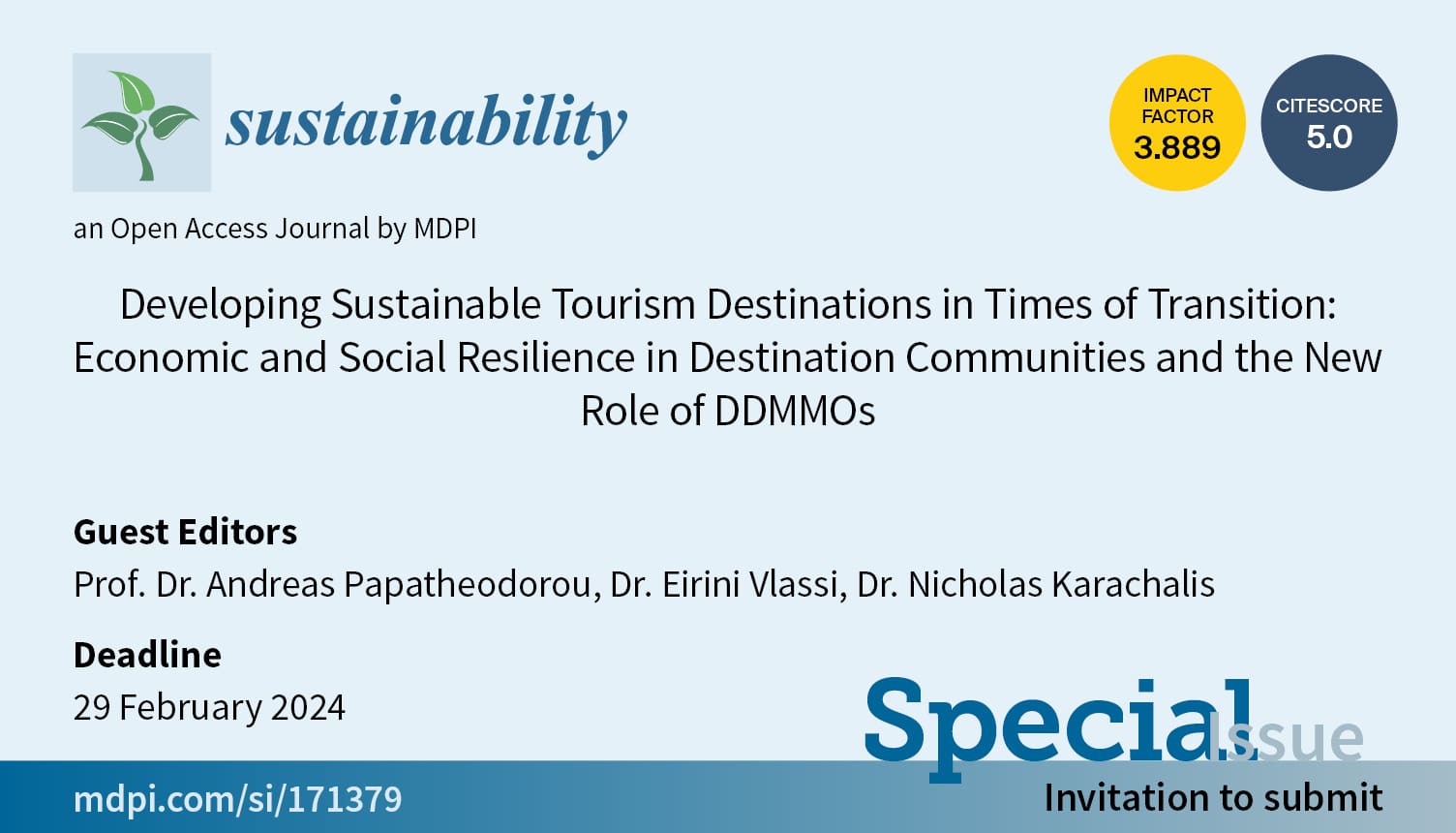Neapolis University Pafos was proudly represented by Dr. Marios Argyrides, Professor of Counselling Psychology and Chair of the Psychology Department, at two high-level international scientific...

We are pleased to inform you about our Special Issue “Developing Sustainable Tourism Destinations in Times of Transition: Economic and Social Resilience in Destination Communities and the New Role of DDMMOs” in Sustainability Journal, MDPI.
The special issue editors are
Prof Andreas Papatheodorou, University of the Aegean
Dr Eirini Vlassi, Neapolis University Pafos
Dr Nikolaos Karachalis University of the Aegean
The economic development and prosperity of the 20th century were greatly influenced by travel and tourism. Governments therefore sought to expand markets, attract visitors, and distinguish their offerings in a competitive environment (Dredge 2016). In this context, Destination Development, Management and Marketing Organizations (DDMMOs) have been gaining popularity since the 1970s; they were originally part of local, regional, or national governments and their responsibilities ranged from marketing and branding, product, and infrastructure development to addressing market failures such as resource management, community relations, etc. (Reinhold and Beritelli 2022; Dredge 2016).
In the 21st century, travel and tourism still constitute economic activities with direct impacts on the economic prosperity and the social development of places (Hassan and Meyer 2022). Tourism is an important source of revenues as it creates jobs, attracts foreign investments, increases revenues per capita, etc. (UNWTO 2020). The EU tourism industry accounted for 9.2% of the EU GDP and 9.9% of total employment (37.8 million employees) in 2019 (WTTC 2022).
The tourism industry, however, underwent major changes due to different forces (environmental, social) that created new needs in terms of destination management and marketing (Flores and Costa 2022; Papatheodorou, 2021). Thus, while destinations, destination authorities and DDMMOs were already trying to address issues such as sustainability, seasonality and overtourism, emergencies caused by the COVID-19 pandemic, the energy crisis and disaster risks (e.g., earthquakes, heavy rains) shaped a demanding future (Gretzel 2019; Milano, Novelli and Cheer 2019, Higgins-Desbiolles 2020). To deal with this blur and transitional period, tourism destinations have invested in capacity building aimed at achieving sustainability and resilience, implementing actions in accordance with the 17 SDGs while public–private partnerships and collaborations have been considered as pivotal prerequisites (Flores and Costa 2022; Vlassi and Papatheodorou, 2021). At the same time, the new conditions cultivated the ground for the emergence of new markets such as digital nomads while pre-existing markets were reconsidered as possible solutions and tools towards resilience and sustainability (Nandasena et al. 2023). Furthermore, community-based and community-owned approaches in destination management are gaining importance, turning the central focus of local tourism policy towards social sustainability (Defner et al, 2020).
This Special Issue is an occasion for authors to submit manuscripts related (but not limited) to the following topics:
You can find more information about our special issue here https://www.mdpi.com/journal/sustainability/special_issues/9P4XZJS7I4 ”
Neapolis University Pafos was proudly represented by Dr. Marios Argyrides, Professor of Counselling Psychology and Chair of the Psychology Department, at two high-level international scientific...
The 16th Graduation Ceremony of Neapolis University Paphos took place on Wednesday, 25 June 2025, in an atmosphere of pride, emotion and optimism for the...